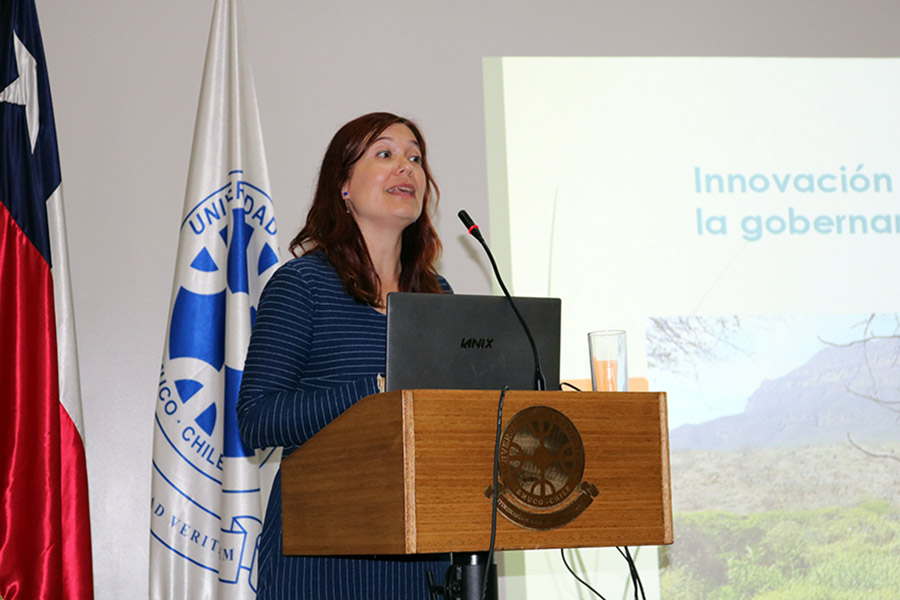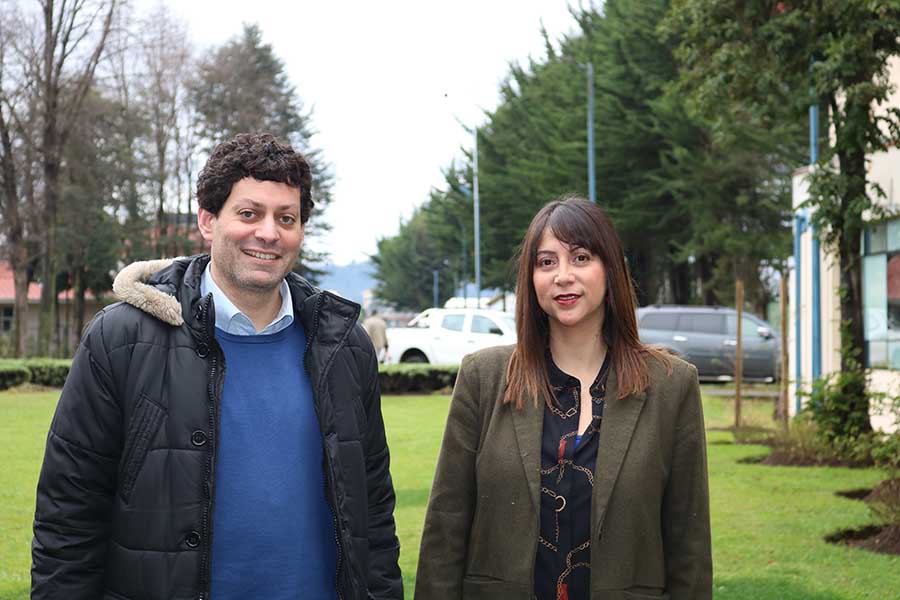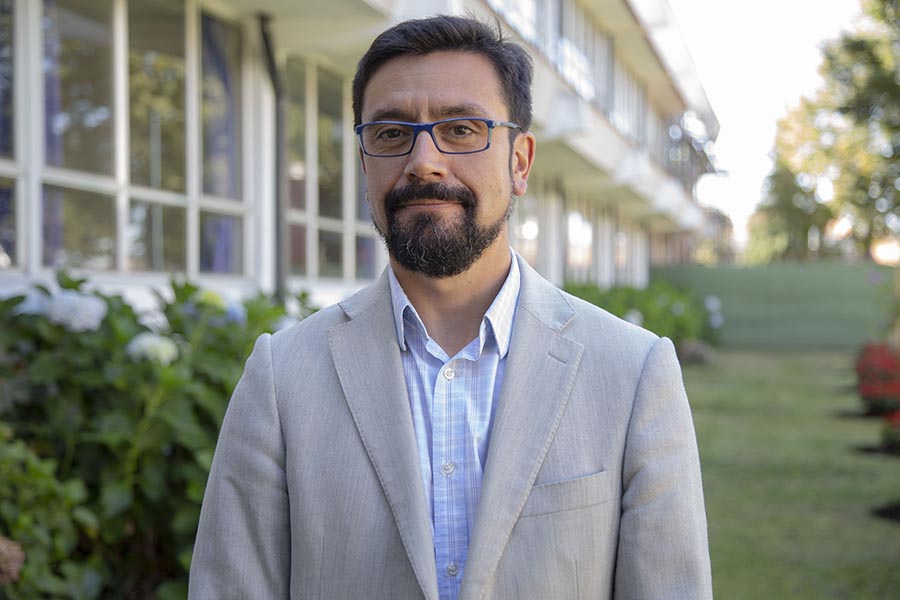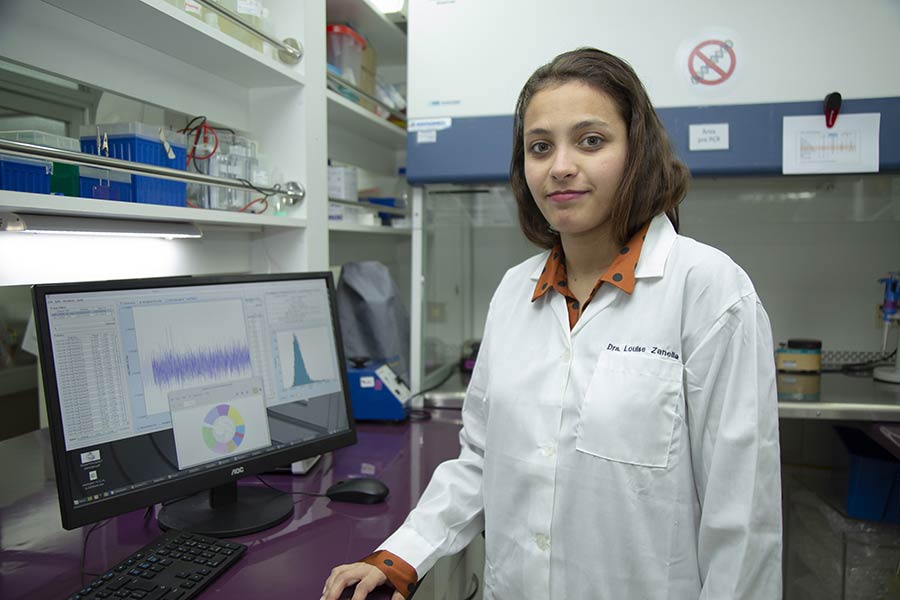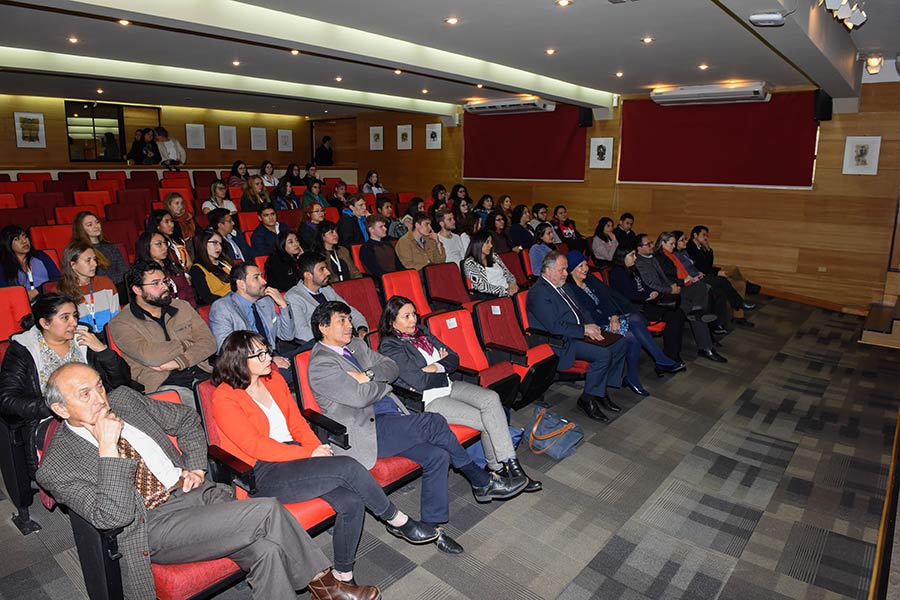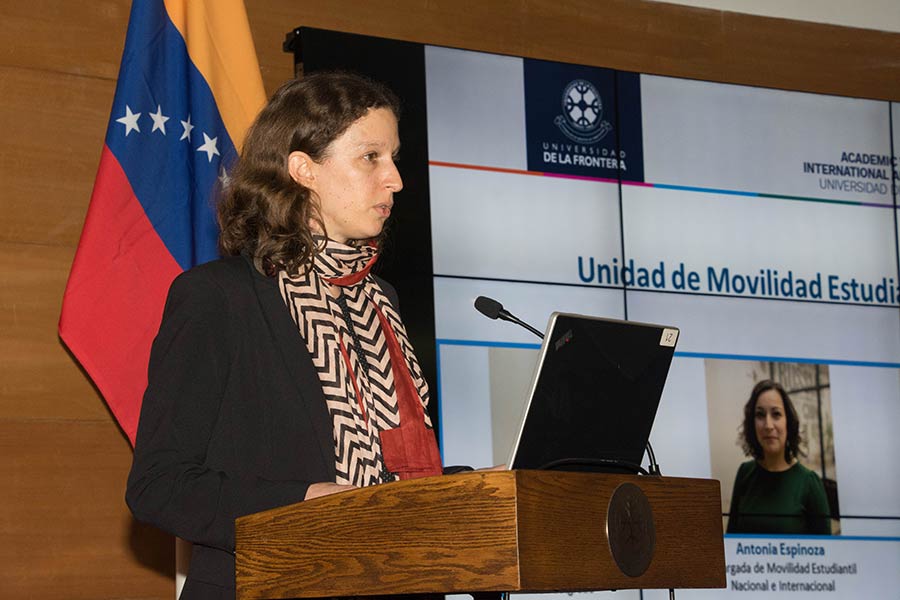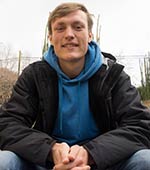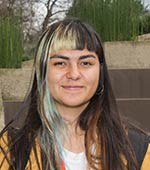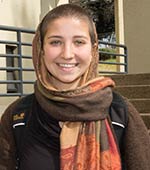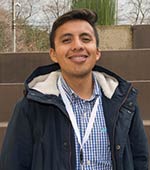|
The current agreement between KU Leuven and the UFRO is one of the few agreements with a history of active cooperation, at the academic as well as the graduate student level. |
Since 2009, the Universities KU Leuven in Belgium and Universidad de La Frontera (UFRO) in Chile maintain two agreements that stand for constant exchange of knowledge between both institutions, through their undergraduate and graduate programs. One of these agreements is related to cooperation in research and the other one is linked to the possibility of obtaining a double degree in the doctoral program offered by the Faculty of Agricultural and Forestry Science of the UFRO. On this occasion, two academics and researchers of the Department of Earth and Environmental Sciences of KU Leuven, Dr. Constanza Parra, an Environmental Social Scientist, and Dr. Anton Van Rompaey, a full professor at the Department of Geography and Tourism, and an expert in Cartography and Analysis of the Landscape and Spatial Modeling, visited the university in order to expand the partnership in other fields of knowledge, since the department of the belgium institution brings together approaches of the Faculty of Agricultural and Forestry Sciences itself, as well as of the fields of engineering and health. In a meeting with Rodolfo Pihan and Dr. Adison Altamirano, the experts shared a brief presentation of the work of the Department of Earth and Environmental Sciences of KU Leuven, and the way in which they carry out multiple studies and projects that are related to the work carried out by the faculty of the UFRO. In this context, Dr. Constanza Parra comments that “the objective of this visit is to strengthen the cooperation that already exists and which different academics and researchers have been stimulating and promoting over the last few years. Unlike other visitors, we belong to the Faculty of Sciences. Before, the cooperation has taken place with the Faculty of Bioscience Engineering, and now, our visit that has been possible thanks to the contact with Dr. Altamirano seeks to strengthen and expand our cooperation and to create new content.” “The idea is to add new professors of the UFRO, who want to contribute to this inter-institutional cooperation, ideally students and academics of other units, who want to visit us in Belgium, either through exchanges or internships, as well as students from other disciplines of KU Leuven who want to come to Chile and to carry out interdisciplinary research, in which different issues of sustainability and environment come together by virtue of an interesting research that provides knowledge that can be applied in the Araucania Region in Chile," Dr. Parra pointed out. Dr. Adison Altamirano emphasized that “the visit strengthens the academic exchange that already exists between these two institutions for about ten years. Including this visit, more than 10 academics of KU Leuven have already come to the UFRO Faculty and a similar number of Chilean academics have visited the university in Belgium. This fact is very satisfying, since this is an agreement that constantly organizes different activities. On the other hand, this is the first seminar we have organized together with both institutions, which is a very important step for our partnership.” At the same time, Dr. Altamirano emphasized the connection that exists between the subjects of both institutions. He pointed out: “The research topics we mostly worked on address socio-ecological aspects, which are almost crossing to the fields of ecology and social sciences. In fact, they met with research groups and students of the Doctoral Program in Agri-Food Sciences and Environment, of which some students obtained a double degree and did internships. This is an extremely relevant topic because the visiting professors expressed their total confidence and willingness to host our students and researchers in the same way as it has happened before with our colleagues and graduate students.” SEMINAR Another purpose of the visit was the seminar “Challenges in Socio-Ecological Systems and their Relation with the Dynamics of the Landscape”, in which the researchers of KU Leuven, together with Dr. Paula Meli, a post-doctoral researcher of the Faculty of Agricultural and Forestry Sciences of the UFRO, and Dr. Adison Altamirano presented their work. The seminar brought a large number of professionals and experts together who were able to learn about quantitative issues, such as the estimation of forest degradation through remote sensing, or even more qualitative aspects related to environmental sustainability. At the same time, the speakers from KU Leuven and the UFRO showed their advances in research, which turned out complementary in realities at the European, Latin American and local levels, as in the case of the Araucania Region in Chile. This diversity of topics allowed the participation of academics in the field of social sciences, who will be able to expand their cooperation with the university in Belgium in the near future. “This is a great opportunity for students of the different doctoral programs of the UFRO, who can opt for a double degree, for example in Agri-Food Sciences and Environment, Applied Cellular and Molecular Biology, Natural Resource Sciences, and in Engineering with specialization in Bioprocesses. This is due to the fact that the double degrees are linked with the group of Science, Technology and Engineering”, Dr. Adison Altamirano explained.
Written by: Communications Office
|
|
The UFRO is leading this project that is financed by the International Development Research Centre in Canada and the TTI’s Opportunity Fund of the Think Tank Initiative. It is an interesting initiative for the analysis of the regional economic development and the cooperation networks between businesses, and four countries are part of it. |
The UFRO is leading this project that is financed by the International Development Research Centre in Canada and the TTI’s Opportunity Fund of the Think Tank Initiative. It is an interesting initiative for the analysis of the regional economic development and the cooperation networks between businesses, and four countries are part of it. Which influence does the productive structure of the territory have on regional development? Is the productive concentration or diversification of the territory relevant? What do other experiences in Latin America show us? Which are the cooperation relations between companies? These are some of the questions that the project of international cooperation, which the Universidad de La Frontera (UFRO) is leading together with three other institutions, is trying to answer through the comparative analysis of different sectors and regions in El Salvador, Paraguay, Uruguay and Chile. The study is financed by the International Development Research Centre (IDRC) in Canada and the TTI’s Opportunity Fund of the Think Tank Initiative. The idea is to establish a characterization and the mapping of the productive specializations and capabilities in the region and to disclose the elements and effects of business cooperation by analyzing a total of 1,336 companies in 26 different sectors in the 4 different countries that are part of the project. The academics who represent Chile and who are the reason the UFRO is leading this project are Dr. Paulina Sanhueza (Faculty of Law and Business) and Dr. Ignacio Rodríguez (Faculty of Education, Social Science and Humanities). They started to develop this initiative in 2016 together with three other institutions: The Center for Analysis and Dissemination of the Paraguayan Economy (CADEP), the Salvadoran Foundation for Economic and Social Development (FUSADES), and the IECON Development Corporation of the University of the Republic (Uruguay). COMPARATIVE ANALYSIS The project aims at results that broaden the empiric evidence on business cooperation networks in Latin American economies. With only few exceptions, the previous empirical studies on this issue focused on cluster cases in countries of North America and Europe. “This is why we have concentrated on an innovative methodology of analysis of social networks that use data obtained by primary sources (surveys), since most of these studies use secondary data in order to measure the impact of business cooperation. This way, our study contributes with an interesting and innovative methodology in this field,” Dr. Sanhueza explained. This project of international cooperation meets all academic expectations, in the sense that “it allows us to apply for competitive funds, to do research with international peers, create knowledge associated with the territory and to involve undergraduate students during the different phases of the project,” the academic added. CHILE In the case of Chile, the Araucania Region was the focus of this study that concentrated on the analysis of productive specializations and the level of business cooperation in the wood, cereal, food, tourism and financial intermediation sector. Dr. Ignacio Rodríguez of the Department of Social Sciences commented: “The analysis of the different networks reveals that the companies that innovate and export the most are those with the most links of cooperation with other companies within their cluster, especially in the touristic sector. Nevertheless, the size of a company or its years of existence do not allow any clear conclusions regarding their links of cooperation.” For the study, 383 companies and 85 organizations were surveyed. In this respect, Dr. Rodriguez indicated: “We were able to observe that the organizations are important when it comes to connecting with networks and creating links between the companies that are part of them.” From a comparative perspective, the countries that have been studied do not show regions with a high local entrepreneurial capacity that can be the main support of a cooperation network. In fact, according to the researchers, “the connectivity of the networks critically depends on the role of the supporting organizations.” This is why one of the components of great relevance within the project is the elaboration of productive development policy recommendations for each country, according to the analyzed cases. The detailed data of each country, sorted by region and the territorial productive specializations and business cooperation is available on the following website: desarrolloterritorial.ei.udelar.edu.uy/tti
Written by: UFRO Communications Office
|
|
Dr. Renato Hunter, the Vice-rector for Research and Graduate Studies of the UFRO visited five universities and technology parks in Israel, together with peers of six other Chilean universities. |
The technological ecosystems developed in Israel since its creation as a state in 1948 have turned this country into a great power in R&D&I. The state invests 4.5% of their GDP in research, the second highest amount worldwide. It also has 354 multinational companies, 23 business incubators, 106 accelerators and more than 250 Venture Capital funds, what turns the country into a leader in startups. With the aim of learning more about that, Dr. Renato Hunter, the Vice-rector for Research and Graduate Studies of the Universidad de La Frontera (UFRO), along with his peers from six other Chilean universities, went to Israel and made a tour, which included several technology parks, universities, institutes and research centers. The synergy between universities and businesses is one of the main strategies. It is a collaborative model that allows to strengthen the research focus regarding the fields of priority in the country. In this context, one of the establishments they visited was the Ben-Gurion University of the Negev in the south of Israel. Its particularity is its Advanced Technology Park that is managed by the university itself. “There is a building in that same park that was built by the university and three others built by multinational companies, which have set up their headquarters for development and research there. They are natural allies, there is an integration between university and company, they work together in a unified way,” Dr. Hunter explained. Another institution they visited was the Technion – Israel Institute of Technology, located in Haifa, in the north of Israel. There, they got to know a technology transfer model characterized by the strong focus on startup creation. The institute is less than 50 years old, has 13,500 thousand students, 60 innovation centers, 3 main research lines and an income of 289 million dollars only by licensing in one year. “They focus on encouraging the students to innovate since the beginning of their professional training. That means that, today, they already registered more than a thousand patents,” Dr. Hunter points out. The University of Haifa, which has a specific and autonomous unit for commercialization and licensing, where the process of intellectual protection and the negotiation to put the product on the market is done, was also on their schedule. “The researcher is not involved in the negotiation process,” the university authority explains. They also found a similar system at the Weizmann Institute of Science in Tel Aviv, whose technology transfer unit operates independently, with an annual budget of 400 million dollars (only for licensing). In Jerusalem, they visited the Hebrew University that already won 8 of the 12 Nobel Prizes the country has. One of the latest successful businesses created at this university is Mobileyes, a security device to prevent car accidents, developed by a professor of the university. “It is interesting how they concentrate on patenting, without focusing on the finished product, but on the different stages of invention, for example, they can enter the market with a formula of a drug, but not necessarily with the finished product,” Dr. Hunter explains. PRODUCTIVITY AND COOPERATION Israel has only nine universities. All of them are public. The state invests the necessary funds so the universities can operate, but the growth of them is financed through competitive projects associated with the priority lines and indicators of productivity. The Israel Research Agency has a group of researchers who visit the different universities and technology parks in order to identify common aspects of development, thus making thematic calls for the development of new technologies and projects. “They focus on specific fields, but above all, they establish a deep cooperative ecosystem. About 300 thousand people are working on knowledge and development. It is a small nucleus, where the main recipe is cooperation and the creation of networks. Besides, they have a culture of failure as a learning process, it is not stigmatized,” the vice-rector comments. After the trip and in order to continue learning about Israel’s R&D&I model, the participants of the Chilean universities are arranging the visit of an expert of the Hebrew University of Jerusalem in Chile, so he can share his experience in technology transfer with the Chilean universities.
Written by: Karimme Riadi
Vice-rectorate for Research and Graduate Affairs |
|
The results of this unprecedented scientific work carried out by Dr. Luoise Zanella have been published in the influential scientific journal Scientific Reports of the recognized publishing house Nature Research. |
It is one of the most common viruses in the human being. The Epstein-Barr Virus (EBV) – a type of herpes virus – is transmitted in 90% of the cases during childhood, without symptoms. But if the infection occurs during adolescence or adulthood, it can cause different pathologies. Amongst the most dangerous are the lymphoma and gastric cancer. Despite of the huge scientific efforts to genetically classify this virus in order to associate it to clinical or epidemiological aspects of the diseases it causes, the results have not been consistent at all, because of its high genetic complexity, leading to mutations and recombination of its genome with the genome of the human cells. But it was Dr. Louise Zanella, a researcher of the Universidad de La Frontera (UFRO), who combined this scenery and achieved to design a new classification scheme of the EBV. “I realized that there was a real problem in the literature about the Epstein-Barr; there was no consensus regarding the classification of the virus, because of the noise generated by its recombination, what did not allow a comparison of the classifications and affected the understanding of its viral evolution,” she explained. In order to solve this problem, she started to establish a different kind of classification than the traditional one, with new variations, identifying those mutations and recombinations that had hindered the process; an effort, no one had made until now. She started to explore the genomes of EBV and analyzed them systematically, with the help of the database that already exists and bioinformatics tools. “We are working with 188 genomes. We choose the preserved parts, identify and remove the recombination and analyze the different classifications,” the researcher explained. This is how they achieved to propose a new scheme of classification of the virus, with major evolutive coherence and potential application in the medical clinic. The results of this unprecedented experience, published in one of the most influential scientific journals, Scientific Reports, of the recognized publishing house Nature Research, also allowed to identify 12 EBV populations, of which three are associated with malignant tumors, what affects the possibilities of an assertive prognosis in patients who are infected by the virus. This is undoubtedly a very important contribution, especially in a country like Chile, where gastric cancer is one of the main causes of death, with a prevalence that puts Chile in first place in Latin America. Dr. Zanella is from Brazil and came to the Universidad de La Frontera two years ago in order to develop a postdoctoral project that is financed by the Performance Agreement. She admitted that genetics and viruses are her passion since she was young. At the Laboratory of Integrative Biology, which is part of BIOREN-UFRO and directed by Dr. Priscilla Brebi, she found a place where to create knowledge in this field. Currently, the researcher is working on two new papers, one about the speed of evolution of EBV and its geographical origin; and the other one about the evolutionary rate of the different identified populations and the age of the virus.
Written by: Karimme Riadi |
|
A total of 60 international students from Germany, Argentina, Bolivia, Brazil, Colombia, Spain, the USA, the Netherlands, Mexico and Poland join the UFRO, together with three national students of other Chilean universities. |
Each semester, students from different parts of the world decide to join the Universidad de La Frontera (UFRO), using the different agreements and student mobility programs for undergraduate studies. Besides, at their universities, they have a good impression of the UFRO and got positive recommendations from those who have already spent a semester or whole year studying at the UFRO. This semester, a total of 60 international students from Germany, Argentina, Bolivia, Brazil, Colombia, Spain, the USA, the Netherlands, Mexico and Poland join the UFRO, together with three national students of other Chilean universities who opted for national mobility through the agreement of Universities of the State of Chile (CUECH). For the Rector of the UFRO, Dr. Eduardo Hebel, student mobility is an essential pillar within the framework of internationalization. “Not only because we have the desire that our students can learn about different realities, but also because by receiving international students at our university, we can enrich a process of personal, professional and cultural growth,” he pointed out. The university authority encourages the students to turn this experience into a time of great learnings. “Make the most of your stays! At the UFRO, you will be able to interact with a community of about 10 thousand undergraduate students, a thousand graduate students and more than 400 researchers, in other words, a great variety of human capital that is willing to help you,” he added. The director of the International Affairs Office gave a warm welcome to the foreign students from about 30 universities and technical institutes from America and Europe. “We hope that everyone will be able to fulfill their expectations and goals. From our point of view, internationalization is more than a challenge in itself, but also a way to achieve greater quality and to fulfill our institutional objectives, without losing the value of interculturality, of the aspects that characterize us," she said. Antonia Espinoza, who is in charge of the National and International Student Mobility Unit of the Universidad de La Frontera, affirmed: “We are very happy that we can welcome students from different universities each semester, thanks to our cooperation agreements.”
Written by: UFRO Communications Office
|






